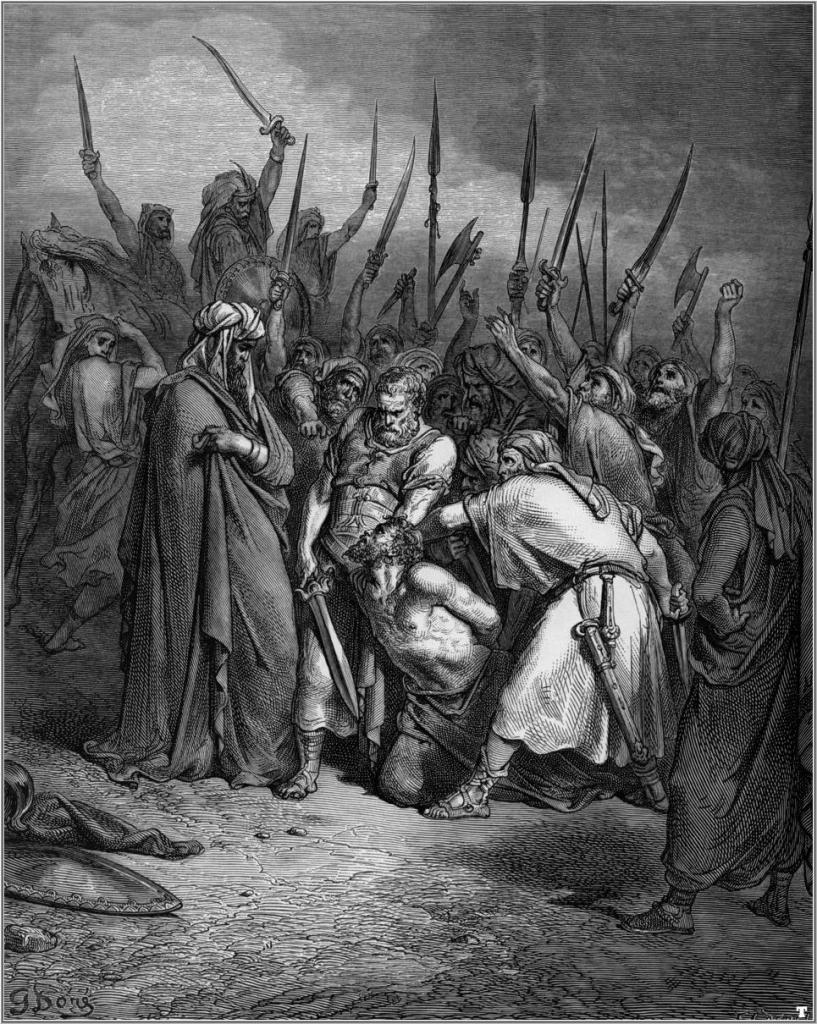I have been posting about the Bible’s genocidal texts. In my experience, many Christians who otherwise know the Bible well scarcely know about these texts, and if they do, they doubt their authenticity. There are reasons for that, and I would argue that we need to change matters.
My Episcopal church uses its lectionary to decide what particular readings it will use throughout the year, but those texts often have what seem like strange omissions. In one cycle, we work through the books of Samuel, and the stories of kings Saul and David. To an attentive listener, though, there are puzzling holes in the plot, threads of the narrative that the church seems determined to avoid. In fact, my church, like most others, tries to navigate around one of the most distressing stories in the Bible, a scripture that has incited real (literal) bloodshed through history. The motives for excluding such texts are obvious enough, but there must be a better way of responding to them than simply pretending they are just not there.
As we hear it in the lectionary, the readings tell how Saul becomes king of Israel, but suddenly, apparently without explanation, God turns against him and deputes the prophet Samuel to seek out a new ruler. The choice lights on David, who goes on to be the monarch of legend. But what did Saul do wrong? Why was God so capricious?
The answer can be found in 1 Samuel 15, and more specifically in passages that are never read in the lectionary. Israel reportedly had an ancient feud with the people of Amalek, to the point that God commanded the Israelites to blot out their very name. God now orders Saul to strike at the Amalekites once and for all, killing every man, woman, child, and animal. But Saul, a rational man, sees no point in such total annihilation, and he takes the Amalekite king Agag as a captive or hostage. This decision earns him a fierce scolding from Samuel, who himself slaughters and dismembers Agag.
 Photograph is my own work: see below for explanation!
Photograph is my own work: see below for explanation!
That’s also why God sends Samuel to find a successor to the kingship. Saul’s sin was failing to be sufficiently total in acts of massacre, and his reluctance led to his own destruction, and the fall of his dynasty. That’s the pivotal story that is missing from the lectionary used by most Protestant denominations, and also the Roman Catholic Church.
Saul is removed because he is rotten at ethnic cleansing. He never got the memo on genocide.
Throughout history, the Amalekite story has agonized faithful readers. Certainly the Bible describes all sorts of horrors, but it depicts a violent world, and its authors would be failing if they did not reflect these realities. In this instance, though, the Biblical writers go beyond mere description to place the blame directly on God. Philosopher Martin Buber reported meeting an observant Jew and confessing to him that he could not accept the story. “Nothing,” wrote Buber, “can make me believe in a God who punishes Saul because he has not murdered his enemy.” He was shocked to find that, far from condemning his skepticism, his more orthodox friend shared his disbelief.
Theological dilemmas apart, the passage has posed real dangers throughout Jewish and Christian history, as it legitimizes ruthless warfare and outright genocide. If authentic Amalekites are difficult to find in practice, believers have had no problem in finding later candidates for that title. Popes mobilized Crusaders against Muslim Amalekites. Reformation-era Protestants used the Amalekite texts to justify massacring Catholics, and Catholics returned the favor. Everyone is an Amalekite to someone.
Identifying enemies as Amalekites was all the easier when clear racial differences existed, as Europeans found in their overseas colonies. When John Winthrop described the covenant relationship between God and the emerging New England, he cited the horrible example of Saul to warn the colonists of the dreadful consequences that would follow if they betrayed their oath. The settlers listened attentively, and well into the eighteenth century, they labeled the Indians they fought simply as Amalekites, with all the fearsome connotations attaching to the label. In nineteenth century Africa, Bible-believing Protestants – German, British, and Afrikaaner – used the title for those native peoples who resisted colonization. Extremist rabbis in modern-day Israel apply the term to Palestinian Arabs.
Against this background, it’s not surprising that modern-day Western churches try to forget the Amalekite story. Actually, though, that response is not just unnecessary, I believe it’s even dangerous. As I suggested in my 2011 book Laying Down the Sword, when we read such passages in their historical context and understand the theological points the authors are trying to make, we understand how wholly impermissible it is to use them to command or justify violence. Read properly, we see how they actually support the Bible’s broader messages of divine love and justice.
But the most important task is to confront such scriptures theologically and historically. If Western churches don’t, then they have no basis for counseling the newer Christian communities that are growing so fast around the world, often with a passionate love for the literal text of the Bible. Faced with the threat of jihad or persecution by hostile faiths, Nigerian or South Sudanese Christians might initially turn the other cheek, but after a while, some turn instead to the fearsome warrior God who is such a prominent figure in the Old Testament. In Rwanda in 1994, Hutu preachers invoked King Saul’s memory to justify the total slaughter of their Tutsi neighbors.
The last Christian who will seek to exterminate another nation on the pretense of killing Amalekites has not yet been born.
If newer believers turn to the violent passages and draw alarming lessons from them, it is currently all but impossible for mainstream Western churches to provide a corrective based on their centuries of experience in handling unsettling scriptures. Not having to face the texts themselves in recent times, churches have lost that institutional memory. They have no basis for dialogue with Global South Christians, and are laying the foundation for new global schisms.
So yes, let’s read those alarming stories, those texts of terror, and come to terms with them. Holy amnesia is no solution.
Just a note about that first photograph. The DeYoung Museum in San Francisco currently has a splendid exhibit on “Rameses the Great and the Gold of the Pharaohs.” Among many other items, the exhibit features some beautiful tiles depicting foreigners who passed through the Egyptian court – Africans, Asians, and others. This specific item depicts an Asian envoy or visitor, who might well have been a Canaanite. Rameses reigned from 1279–1213 BC, and is often cited as the Pharaoh most likely to have presided over the Exodus, whatever that exactly entailed. In other words, if that actually is a Canaanite, that is exactly the kind of person so often denounced in the biblical genocide passages.


















